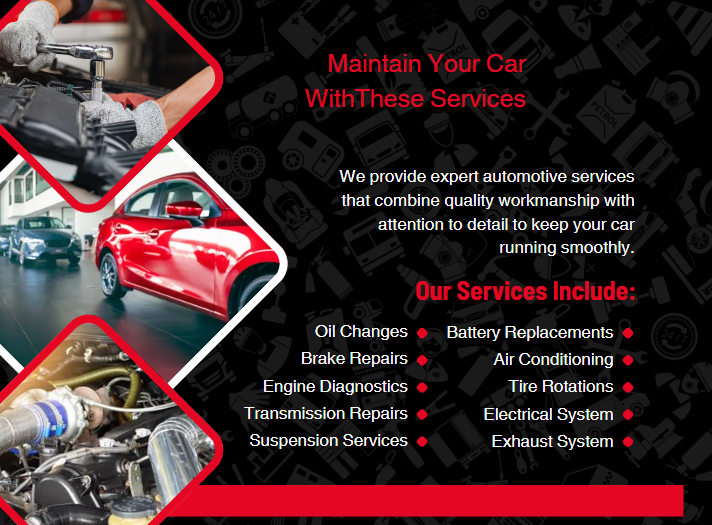
The Essential Guide to Car Maintenance: Keep Your Ride Running Smoothly
1. Regular Oil Changes: The Lifeblood of Your Engine
One of the most important maintenance tasks is changing your car’s engine oil. Oil lubricates the engine’s moving parts, reduces friction, and prevents overheating. Over time, oil breaks down and becomes contaminated, leading to engine wear and potential damage. Regular oil changes are essential for keeping your engine running efficiently.
How Often to Change Your Oil:
- Conventional Oil: Every 3,000 to 5,000 miles (or every 3-6 months, whichever comes first).
- Synthetic Oil: Every 7,500 to 10,000 miles (or every 6-12 months, depending on the manufacturer’s recommendation).
Tip: Always follow the manufacturer’s recommendations in your owner’s manual for oil type and change intervals. Using the right oil and changing it at the right time can significantly extend the life of your engine.
2. Tire Care: Keep Your Tires in Tip-Top Shape
Tires are the only part of your car that makes contact with the road, so it's essential to keep them in good condition. Proper tire care can improve fuel efficiency, enhance vehicle handling, and reduce the risk of a blowout.
Essential Tire Maintenance Tasks:
- Check Tire Pressure: Low tire pressure can lead to poor fuel economy and tire wear. Check your tire pressure monthly using a tire gauge, especially before long trips. Keep tires inflated to the manufacturer’s recommended PSI (pounds per square inch), usually found on the inside of the driver’s door frame or in the owner’s manual.
- Tire Rotation: Rotate your tires every 6,000 to 8,000 miles to ensure even wear. Uneven tire wear can lead to poor handling and shorter tire life.
- Tread Depth: Use the "penny test" to check tire tread. Insert a penny into the tread with Lincoln's head facing down—if you can see the top of his head, your tires need replacing.
Tip: If your car shakes or pulls to one side while driving, it could be a sign of uneven tire wear, misalignment, or tire damage. Have it checked out immediately.
3. Brake Maintenance: Stay Safe on the Road
Brakes are one of the most critical safety features in any vehicle. Regular brake maintenance ensures that your vehicle can stop effectively when needed, reducing the risk of accidents.
Signs You Need Brake Maintenance:
- Squeaking or Grinding Sounds: If you hear a high-pitched squeal or grinding sound when applying the brakes, it could indicate worn-out brake pads.
- Vibration When Braking: If the brake pedal vibrates or pulses when you apply the brakes, it could be a sign of warped rotors.
- Longer Stopping Distance: If it takes longer than usual to stop your car, have your brake system checked immediately.
Tip: Replace your brake pads every 30,000 to 50,000 miles, but if you notice any of the above signs, get your brakes inspected sooner. Regularly checking and maintaining your brake system can save you from costly repairs down the road and, more importantly, keep you safe.
4. Fluid Levels: The Lifeblood of Your Car's Systems
Your car has a variety of fluids that keep everything running smoothly, from the engine to the transmission to the brakes. Keeping an eye on your fluid levels and topping them up when needed can prevent costly breakdowns and keep your vehicle in optimal condition.
Key Fluids to Check:
- Engine Oil: As mentioned above, regular oil changes are essential, but it’s also important to check the oil level periodically.
- Coolant/Antifreeze: The coolant prevents the engine from overheating. Low coolant levels can cause your engine to overheat, leading to severe damage.
- Brake Fluid: Brake fluid is vital for proper braking function. Low brake fluid can lead to brake failure.
- Transmission Fluid: Transmission fluid keeps your transmission running smoothly and helps prevent slipping. Check the level and color—dark or burnt fluid is a sign it’s time for a change.
- Power Steering Fluid: If your steering becomes stiff or hard to control, you may have low power steering fluid.
Tip: Check fluid levels at least once a month. If a fluid level is low, inspect for leaks and address them promptly.
